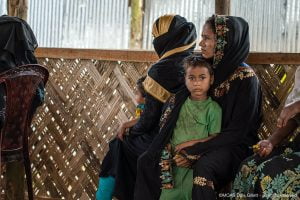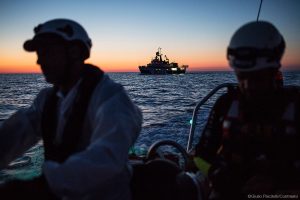Pope Francis ended with these words his long-awaited tour in South-East Asia where he visited Myanmar and Bangladesh, two countries at the very core of what is, according to the UN, the world’s fastest growing refugee crisis. Last August 25th an unprecedented exodus started, leading more than 624,000 children, women and men to cross the border with Bangladesh and seek sanctuary. Violence erupted at the end of summer 2017 and is probably the worst in the recent history of this stateless Muslim minority, which is marked by abuse and persecutions. Formerly living in the Rakhine State in Northern Myanmar, the Rohingya community in this country is a target of widespread repression, and last September 11th the UN described the unfolding violence as a “textbook example of ethnic cleansing”.
Since the beginning of the clashes, at MOAS we decided to welcome His Holiness’ appeal –launched on August 27th– not to forget the immense suffering of this tormented and persecuted minority. So, after shifting our mission from the Mediterranean into Bangladesh, in 3 months alone we have delivered 40 tons of food aid to the Bangladeshi government and opened two field hospitals, called MOAS Aid Stations, in order to provide sorely-needed medical assistance and care. The first MOAS Aid Station was launched on October 14th in Shamlapur, a fishing village, and the second one on November 10th in Unchiprang. During the first week, our medical unit in Shamlapur assisted 1500 patients, with a current daily average of 300 visits per Aid Station. However, beyond the strictly medical and technical perspective, which has already been addressed, it is crucial to explore the human side of this crisis. Every day in makeshift camps and settlements, where thousands of people are still arriving, we experience first-hand the profound human nature of the Rohingya crisis.
Those who survive persecutions have to face fatal and distressing journeys both for their bodies and for their souls. Apart from facing life-threatening situations, people cannot eat, drink or receive proper medical treatment while they flee using desperate means.
But, today these life-threatening situations, violence and persecutions which embody the Rohingya plight can no longer be ignored by the entire world and international community at all levels.
Pope Francis’ hug with 16 Rohingya refugees ripped away the veil of silence and indifference, shining a light on their immense humanitarian catastrophe. Nobody can now pretend to be unaware of their fate.

Nobody can ignore that God is in every child, woman or man who survived widespread killings. In the very same mud where these rejected people live, posing enormous challenges to those who provide medical services, the presence of God is very intense. Life beats stronger where it is at risk. But when he is moved, Pope Francis goes far beyond a mere hug to show his deep humanity, and during their private meeting he was finally free to pronounce the name of this persecuted minority: Rohingya. During his 21st international apostolic trip, Pope Francis was advised not to say their name, even if everyone knew that they were the reason he had planned this last tour.
Their presence could be felt when he asked us not to forget neglected or suffering people, as well as those who are persecuted and victims of injustice. However, just before leaving, he pronounced this controversial word, together with another one: forgiveness.
Pope Francis asked for forgiveness on behalf of the international community, which is deliberately ignoring the immense pain of our Rohingya brothers and sisters. He also asked us to avoid the “globalisation of indifference” and help those who are committed to mitigating the current humanitarian crisis, which is already turning into a real catastrophe.
The whole MOAS team and I are happy and proud to follow the path of peace, solidarity and mercy defined by His Holiness’ words, and we are supported by a courageous spirit of brotherhood, which identifies a fragment of the salt that flavours our human family in every person we assist.
“God created man in his image and likeness. All of us are this image.These brothers and sisters of ours, as well. They too are an image of the living God. One of your religious traditions says that God, in the beginning, took some salt and cast it in the water that was the soul of all men and women. Each of us carries within himself a little of the divine salt. These brothers and sisters of ours carry within them the salt of God”
*From Pope Francis’ speech in Dhaka
This article was originally published by the Italian magazine VITA
Please click here to read the Italian version



